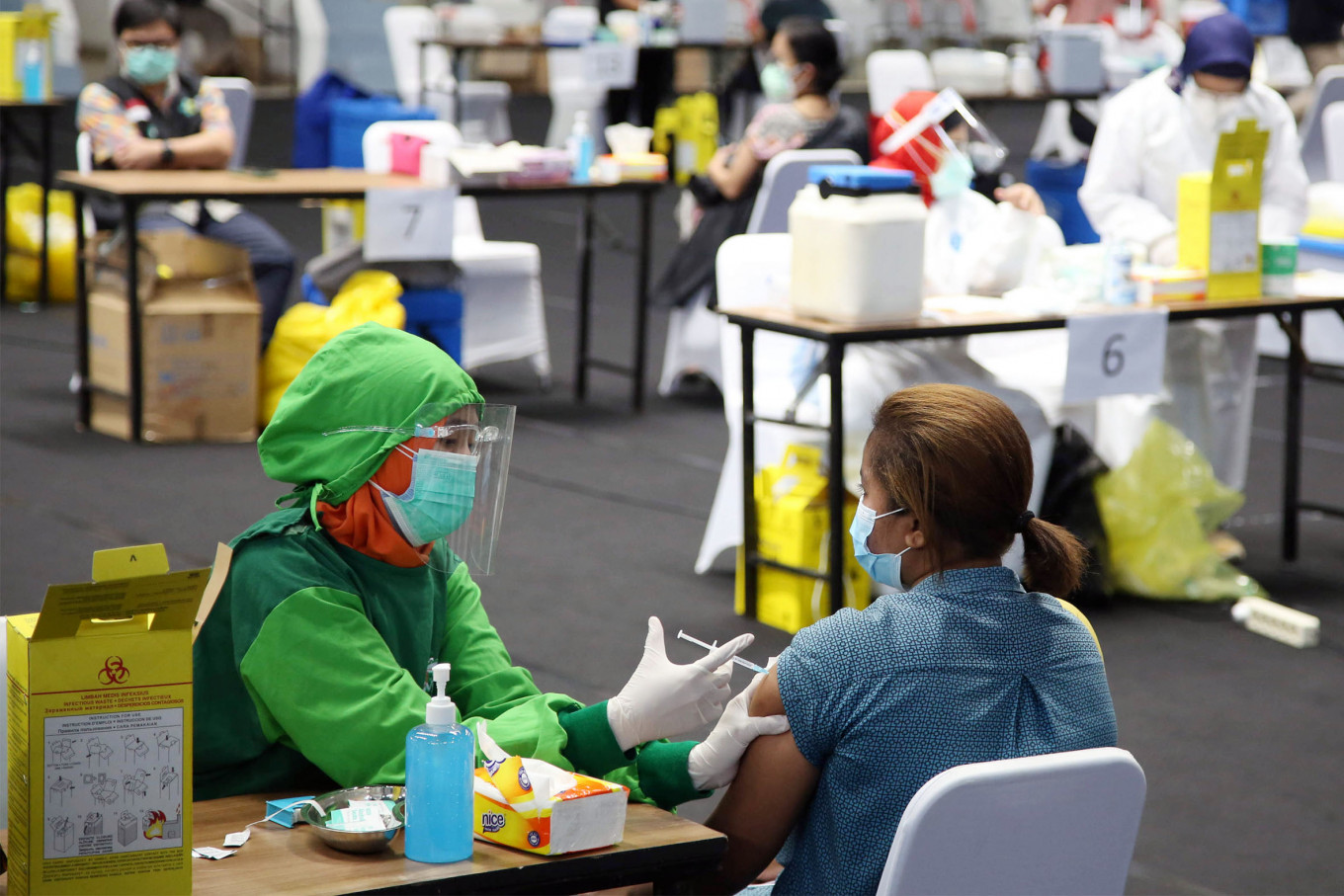Anger as graft suspects, lawmakers’ families get vaccinated
In Indonesia, corruption detainees and lawmakers' families are among people on the recipient list during the second phase of the national COVID-19 vaccination drive.
Change Size

T
he inoculation of corruption suspects and families of lawmakers has prompted allegations of favoritism amid shortages in supplies of the COVID-19 vaccine.
After inoculating medical workers in the first phase, the government has rolled out the second phase of its COVID-19 vaccination drive. Authorities are targeting around 38 million people, including the elderly, athletes and public service and essential workers between February and May.
However, the Corruption Eradication Commission (KPK) recently made headlines for distributing vaccines to graft suspects in its custody.
The antigraft body is currently holding 61 graft suspects in detention centers at and near its headquarters in South Jakarta.
According to the commission’s statement, 39 detainees received their first shot of the COVID-19 vaccine, including former Cabinet ministers Juliari Batubara and Edhy Prabowo.
The KPK arrested then-social affairs minister Juliari in December last year for his alleged role in a graft case pertaining to the distribution of COVID-19 social aid. Meanwhile, former maritime affairs and fisheries minister Edhy was named a suspect in late November 2020 for allegedly accepting bribes pertaining to lobster larvae export permits.
KPK spokesperson Ali Fikri said the vaccination drive for the detainees occurred between Feb. 18 and Tuesday, when vaccinators also inoculated 1,738 KPK employees. He added that the remaining detainees did not receive the first dose of the vaccine for health reasons.
Read also: Indonesia has limited vaccine supplies. Is it prioritizing the right groups?
In a separate statement issued on Thursday, KPK chairman Firli Bahuri said authorities decided to give the detainees the vaccine given the high number of COVID-19 cases among them. According to the antigraft body, at least 20 graft suspects held in the detention centers tested positive for the coronavirus.
He argued that the detainees were among the people most vulnerable to contracting and transmitting the virus because they made contact with many people, including investigators, lawyers and detention center guards.
“The vaccination drive is also an attempt to protect those people. The suspects’ health is also important to expedite the investigation process,” Firli said.
National COVID-19 task force spokesperson Wiku Adisasmito said on Thursday that the vaccination of KPK detainees was conducted based on “data-based considerations”. He added that health authorities had confirmed more than 100 COVID-19 cases within the antigraft body’s facilities.
At the House of Representatives family members of lawmakers were also named on the vaccine recipient list. The legislative body has held a vaccination drive for lawmakers, staffers and House internal security officers since Wednesday.
Prosperous Justice Party (PKS) executive Mardani Ali Sera, who received the first dose of the vaccine on Friday, confirmed that the lawmakers’ family members had also received the COVID-19 vaccine. But he added that his wife, who was infected by COVID-19 and had recovered, decided not to get the jab.
When asked the reason for the inclusion of lawmakers’ families in the vaccination program, he said it was enacted under the House’s secretary-general’s policy.
House secretary-general Indra Iskandar said he referred to a Health Ministry directive before selecting people for the vaccination drive. Indra went on to say that he decided to include the lawmakers’ family members because “every citizen will be vaccinated eventually.”
“The [main] principle is that every citizen will get vaccinated, as long as they fulfill the requirements,” Indra said. “It’s pointless if only the head of the family is vaccinated, leaving other family members exposed to the risk of contracting [COVID-19].”
He added it would take up to 22,000 doses to inoculate everyone in two doses in the House’s vaccination drive.
Read also: Indonesia, UNICEF sign agreement on COVID-19 vaccine procurement under COVAX Facility
Observers have warned the government over concerns about the inequality of vaccine access due to the limited supply of vaccines. Indonesia has received 3 million doses of ready-to-use vaccines from Chinese firm Sinovac Biotech Ltd, which were distributed to medical workers. The country had also received the equivalent of 25 million doses in bulk vaccine from Sinovac, which will be used by state-owned pharmaceutical company PT Bio Farma to manufacture shots. Bio Farma president director Honesti Basyir said the firm would only be distributing 7.5 million doses of the vaccine in February.
The country is also expecting 140 million bulk doses of CoronaVac in increments until July, and has secured 13.7 million doses of AstraZeneca’s vaccine through the multilateral COVAX Facility initiative, which will start distributing them to recipient countries by the end of this month, AFP reported.
Indonesia is aiming to inoculate 181.5 million people under its free vaccination drive, which is expected to run until 2022. For this program, health authorities will need around 426 million doses.
Experts have urged health authorities to prioritize vulnerable sections of the population in order to reduce hospitalizations and deaths among high-risk groups.
Epidemiologist from Griffith University in Australia Dicky Budiman lambasted the move to prioritize corruption detainees and lawmakers’ families in the vaccination drive.
“This proves that the vaccination drive has weaknesses in terms of transparency and the priority is not based on public health [principles]. We should prioritize high-risk groups such as health workers, the elderly and people with comorbidities,” Dicky said.
He called on the government to be transparent in launching the inoculation campaign. “If people outside the high-risk groups are on the vaccine recipient list, it is surely a misappropriation [of vaccine distribution.”
-- Nina A. Loasana contributed to the story









